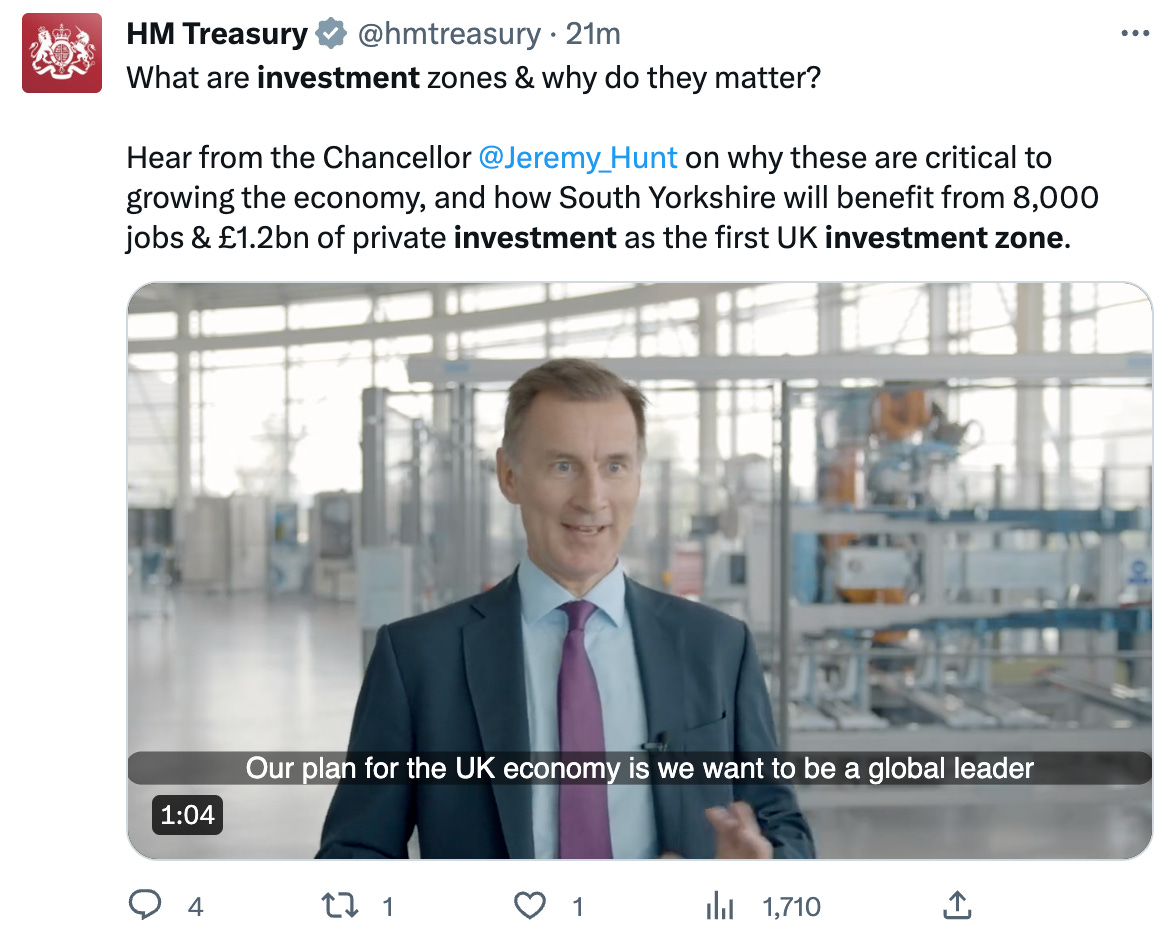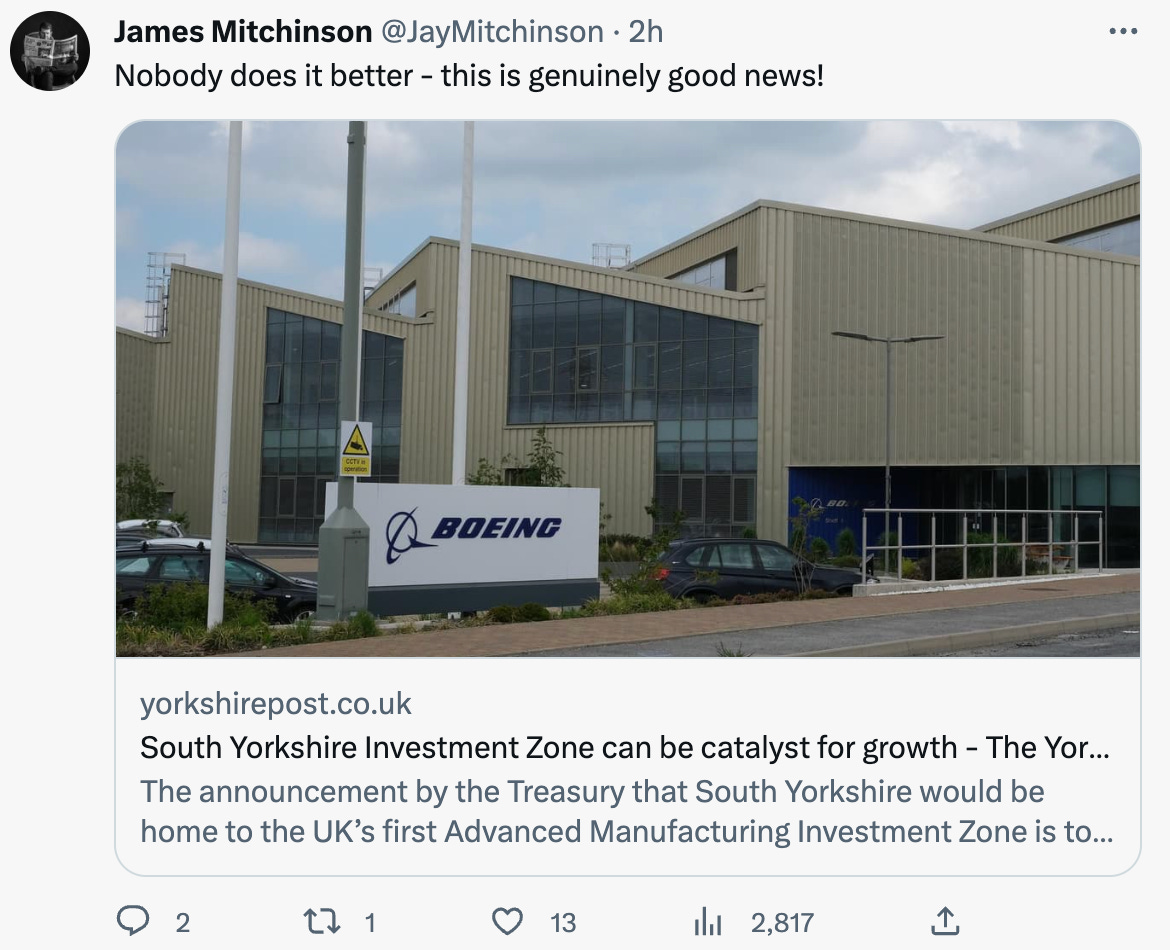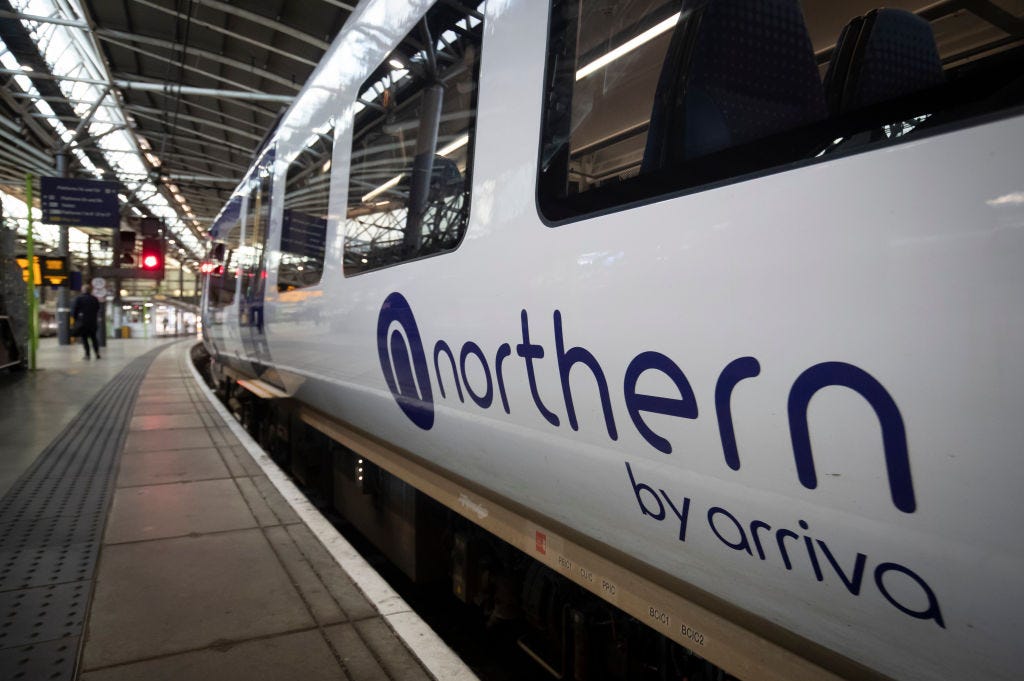Hello everyone and welcome to the latest Off to Lunch…
South Yorkshire has been named as the UK’s first investment zone. This means the area will benefit from a £80 million package of grants, infrastructure improvements and tax breaks designed to attract investment.
Liz Truss and Kwasi Kwarteng announced that the UK would get investment zones as part of their doomed mini-Budget last September. It is one of the few proposals from that mini-Budget that survived, although Jeremy Hunt, the chancellor, significantly downsized the proposals in his Autumn Statement, saying there will be just 12 investment zones across the UK.
The South Yorkshire zone will focus on advanced manufacturing and covers Sheffield, Rotherham, Doncaster and Barnsley, including the University of Sheffield and Sheffield Hallam University.
£80 million of government funding may not seem much, especially compared to the billions of dollars of subsidies being offered by the US, but that money coupled with a clear strategy and the promotion of the area will help to encourage businesses to invest, including businesses from the UK and abroad
Alongside the government’s announcement, Boeing, the US planemaker, has said it will back a collection of research and development projects at the University of Sheffield’s Advanced Manufacturing Research Centre Factory 2050. Boeing will work with Spirit AeroSystems, a US company that builds the structures of planes, and UK automation company Loop Technology to provide investment of £80 million alongside the government.
The government claims that the investment zone will “help to deliver” an estimated 8,000 new jobs and £1.2 billion of private investment by 2030.
Jeremy Hunt visited the Advanced Manufacturing Research Centre in Sheffield on Thursday, which is the image above. The chancellor said:
“Our first investment zone is a shining example of how we will drive growth across the country.
“It’s already secured more than £80 million of private investment, including backing from Boeing, and will help support more than 8,000 jobs by 2030.”
Two of the other investment zones will be in Scotland - with Glasgow and the north-east of Scotland identified as the most likely locations. Other areas in the running to be investment zones are Manchester, Liverpool, the West and East Midlands and Tees Valley.
This is some of the reaction to the investment zone, starting with Oliver Coppard, the Labor mayor of South Yorkshire. We then have a tweet from the Treasury and James Mitchinson, who is the editor of The Yorkshire Post…
Other stories that matter…
1. A cost-of-living survey by the Office for National Statistics has found that one in 20 adults have run out of food and been unable to afford more in the last two weeks, and that 35 per cent adults are finding it “difficult” to pay their rent or mortgage. It’s a sobering report and you can find it here
2. Shares in Sheffield-based Zoo Digital have fallen by nearly 30 per cent after the company warned that revenues were lower than expected because it has been hurt by the writers’ strike in Hollywood and big streaming services cutting back on new programmes to save costs. Zoo Digital provides subtitles and dubbing to Hollywood studios. The company also said in a stock market statement that it was restating its profits from last year after “revised guidance from its auditors with regards to the interpretation of IFRS 15”. You can find Zoo Digital’s statement here
3. Could white hydrogen help to meet our future energy needs? According to Ambrose Evans-Pritchard in The Telegraph, there could be vast reserves beneath Turkey, the Philippines, Mali and other places that could be accessed and utilised cheaply with new technology. Piece here
4. The Federal Trade Commission, the US consumer watchdog, has launched an investigation into OpenAI, the company behind the ground-breaking ChatGPT chatbot, and whether it is putting personal reputations and data at risk. The FTC wants to know what OpenAI is doing to address the risk that it may “generate statements about real individuals that are false, misleading, or disparaging”. Reuters story here. Meanwhile the Associated Press has signed one of the first media deals to partner with OpenAI. The deal means ChatGPT will be able to access some of AP’s archive of text stories going back to 1985 to train its algorithms. Axios story here
5. There are two thought-provoking pieces in the Financial Times about housing. Firstly, there is a data analysis that looks at how rising house prices mean that owning property has become intrinsically linked to hereditary wealth and being able to get money from your parents to buy a home. This trend is getting strong and threatens to entrench inequality, the piece says, which you can read here. Secondly, the FT also has a feature that looks at one of the consequences of rising property prices - big cities including London are seeing a drop in the number of children living there because families have to move to find an affordable home. You can read that piece here
6. The subsidy race between the US and Europe to attract investment that creates new factories and new manufacturing jobs is foolhardy because many of these jobs now require lower skills and offer lower pay than jobs in the services sector, according to a piece in the new edition of The Economist here. This race will end with voters upset that it didn’t create the jobs or economic growth that was promised, or with countries failing to boost manufacturing as much as hoped.
7. An interesting column from Harry Wallop in The Times on data, cricket and remembering the limitations of what data can show. “Data, by its very nature, can only reflect what has gone before,” he writes. “The Bank of England is always looking in its rearview mirror to work out which lane to take: a reasonable approach if the traffic on the road is the same. What if we are in a new era, though: what if the UK economy is undergoing its own version of Bazball and everything we thought we knew about interest rates no longer makes sense?” Column here
And finally…
“The next station is: Good news for rail passengers in the north of England.” Northern Trains is to correct the mispronunciation of station names in its on-board announcements.
The train operator asked for feedback from local residents about the pronunciation of the 467 stations in its network and received a series of suggestions and corrections. It will change Burneside in Cumbria from Burn-Side to Burn-E-Side, Ashburys in Manchester from Ashbury to Ashburys, Slaithwaite in Yorkshire from Slaith-Wait to Slou-Wit and Mossley Hill in Liverpool from Mozzley-ill to Mose-ley Hill.
You can find Northern’s announcement on this here and a story by The Guardian here
Thanks for reading. If you enjoy Off to Lunch then please share it with others and spread the word. If this newsletter was shared with you then please sign-up below to become a member, get Off to Lunch sent directly to your inbox, and contribute to the work of Off to Lunch
Best
Graham










